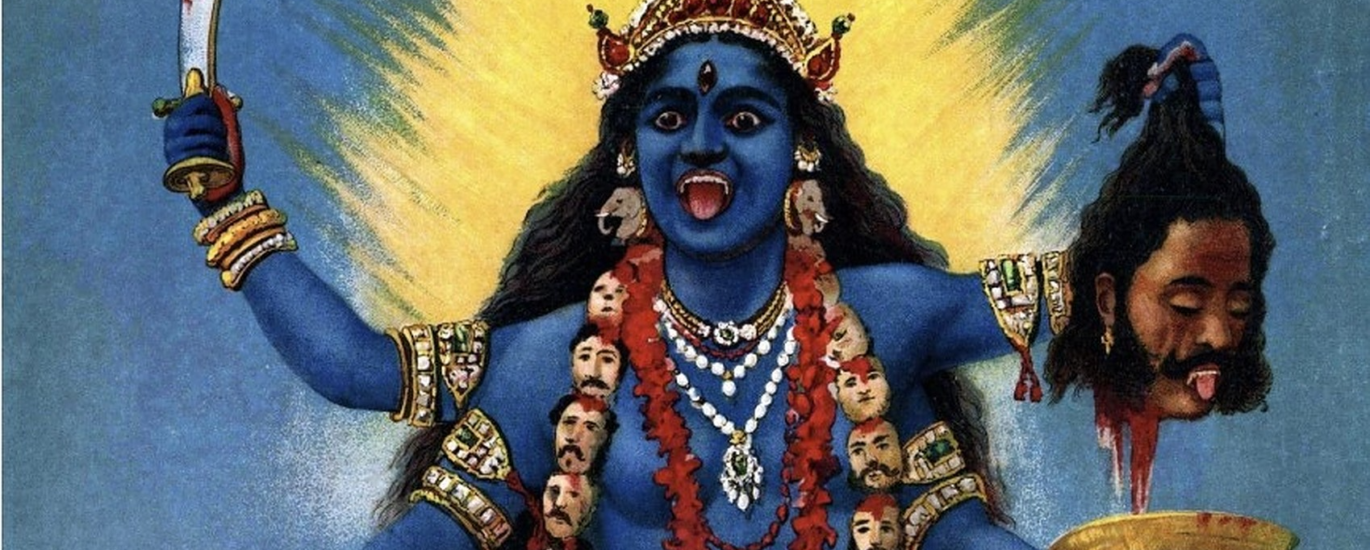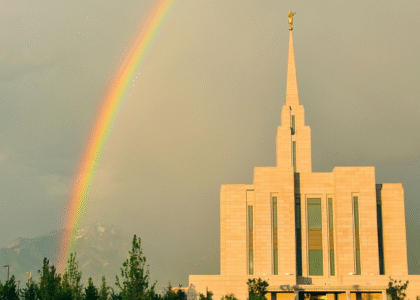“a woman wearing pink strikes terror in the hearts of many a village thug”
Amy is joined by Acharya Shunya to discuss her book Roar Like a Goddess: Every Woman’s Guide to Becoming Unapologetically Powerful, Prosperous, and Peaceful and discuss the importance of powerful female deities in the Hindu tradition.
Our Guest
Acharya Shunya
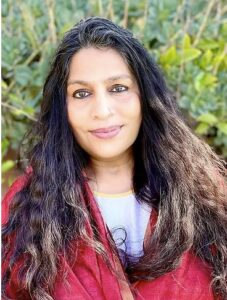
Acharya Shunya is a truth-teller who facilitates authenticity, self-remembrance, and divine feminine pathways to awakening. The first female head of her spiritual lineage that traces its roots to 2,000-year-ago in India, Acharya Shunya represents the ancient Vedic tradition of India in a way that is completely authentic, yet as relevant as possible to modern sensibilities and needs.
Acharya Shunya reinterprets and re-contextualizes ancient Vedic wisdom and dharma teachings of Advaita Vedanta (nondual teachings), Ayurveda’s lifestyle wisdom and Yoga philosophy, to create a learning and awakening path for contemporary seekers, empowering people everywhere to lead spiritually fearless, fulfilled and enlightened lives. Her teachings acts like a bridge between ancient wisdom and issues faced by modern humans, today.
Acharya Shunya is the author of three bestselling books Ayurveda lifestyle Wisdom (2017), Sovereign Self (2020) and her newest book – Roar Like a Goddess: Every Woman’s Guide to Becoming Unapologetically Powerful, Prosperous, and Peaceful. In this book, Acharya Shunya honors her progressive Vedic roots while breaking the shackles of tradition to bring modern-day women, an inclusive, feminist spirituality.
The Discussion
Amy Allebest: On Season One of our podcast, we learned that ancient Mesopotamian goddesses had at first been all-powerful, encompassing many different strengths. But when patriarchal cultures took over, they placed an all-powerful male God at the top of the pantheon and divided up the goddesses into many less powerful goddesses like the goddess of love, the goddess of wisdom, the goddess of war, and the goddess of the hearth, and even lesser goddesses. There were many goddesses, but each one was just a splinter of the original creator goddess, preventing a consolidation of power in any one female figure in these new patriarchal mythologies. If there was an all-powerful God, like Zeus, for example, if he did have a female counterpart, she was a weak, jealous wife with no real authority.
Unlike the religions of the Middle East and of Europe, some ancient religions did not undergo this patriarchal change. Hinduism, which may be the world’s oldest religion, has been around since at least 2000 BCE, and it is still very much a religion of powerful goddesses. Today we’re going to learn about these goddesses and about what the implications of such a religion can be for women. And I’m so honored to welcome to the podcast today, Acharya Shunya, who is a Hindu teacher and spiritual leader, and she’ll be teaching us all about the Hindu goddesses. Welcome, Acharya Shunya!
Acharya Shunya: Thank you, Amy, for having me! I’m looking forward to our conversation.
AA: I’m so looking forward to it, and I learned so much from your book, and we’re going to take your book as a focal point for the conversation today. It’s called Roar Like a Goddess: Every Woman’s Guide to Becoming Unapologetically Powerful, Prosperous & Peaceful.
I wondered if we could start out the episode with you just introducing yourself. Tell us a little bit about where you’re from and what brings you to the work that you do.
AS: My name is Acharya Shunya. Rather, my name is Shunya, which means “infinity” in Sanskrit. And Acharya is my title, which is given to an ordained teacher. I’m the first female head of a 2000 year old Hindu lineage of male monks, and the first to teach in the West. And I grew up in a beautiful family that taught me much about the non-dual and divine feminine tradition of India. And this family also asks that we take on sexual or marriage partners. And when I took on a partner, all hell broke loose because I moved from a wisdom family into a typical family where I met all those demons out there that had been lurking forever: patriarchy, misogyny, shame, blame. And I have made it a mission to address this squarely and firmly, and not push it under the rug and only shine the privileges that I have enjoyed as a spiritual teacher.
I want to talk about my gender, I want to talk about an unfair planet. I want to talk about the discomfort that I have faced and many women and many beings of fluid genders have faced. And so that’s who I am. That’s why I wrote this book, and I’m feeling mighty relieved after writing it.
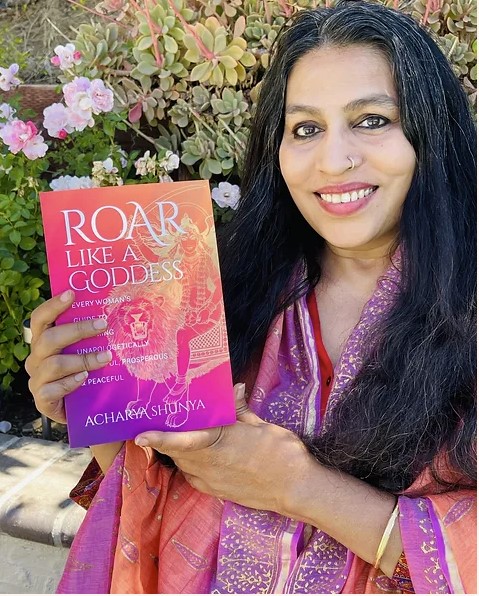
AA: Haha! I imagine it was quite a labor to write the book.
AS: It was easy, actually. I’ve written other books that have taken longer time. This book seemed to just flow out of me because clearly it is my work to do. And I didn’t know it, Amy, because there are books you plan and you churn in your mind, and then there are books that use you to be born. And on an unexpected day, I was working on a different academic book on Vedic Hindu psychology and I was compelled to start a fresh page on my laptop, and this book came out in four months.
AA: Oh, you’re kidding, that’s amazing.
AS: And my publishers loved it. And with barely a few changes it’s out in the world and making a lot of waves.
AA: Oh, that’s fantastic. Well, I absolutely loved it. Like I said, I learned so much. I realized honestly how little I knew about Hinduism. And so that was just a wonderful education, but could I ask you one more question about your spiritual lineage and tradition and how it came about that you’re the first female leader in this long tradition?
AS: The deepest philosophy of the Hindus is known as “Advaita” which means “not two”. It believes in radical oneness and unity of consciousness. And this consciousness transcends form, name, gender, and other divisions. As a result, my family, which has been a keeper of this wisdom and a teacher of this wisdom and a promoter of this way of higher thinking, has always been open to other genders leading the way. Except it’s interesting that 2000 years ago, I had ancestors – a male teacher and his female consort, both of them were teachers. So I did have a female role model, but she went 2000 years ago. And then India was steeped in patriarchy and feudalistic thinking and the dark ages of Indian culture. So while the religion itself gave us liberty to find the truth in any form, any gender, the culture itself had somewhat restricted the choices in my lineage. And maybe out of habit or compulsion or because it’s comfortable, a male lineage-holder was chosen, until my grandfather came along. And way before I was born he said, nope, we’re not doing this. We’re going to do it the real way, the way the seers wanted us. Because the Vedas themselves have been authored, not just by male seers, but by females too. The first holy books in the world have contributions from female seers too, not just men.
He said, I’m going to open up my wisdom school to the girl child, I’m going to open up my wisdom school to children of the lower caste. Because the caste system was prevalent as a social evil at that time. It’s not an original Hindu phenomenon, it’s social incrustation. Dirt that is accumulated in the Hindu culture. And my grandfather, my guru, I call him Baba which means the great elder, beloved elder, he said, “no, we’re done with it.” And the wisdom school that I was born into and that made me the Acharya that I am today was already thriving with many a girl child studying the great Vedas, chanting, meditating.
And then when I came along, when I was only nine years old, my Baba probably saw that one day I would be having these conversations, writing these books, and amongst a bevvy of male students, cousins, brothers, he chose me and declared that I would be the one that I would travel abroad – and I didn’t know what abroad meant at that time, Amy – that I would travel abroad. I would develop institutions and foundations for the disbursement of the pure Vedic knowledge. And clearly he believed in me before I knew who I am. And now here I am doing his work, what he had started. So I feel proud to belong to a family that didn’t follow rules. And I’m going to continue to make new rules and not follow the ones that no longer serve all beings.
AA: What a beautiful and powerful story. I’m so grateful that you shared that. That’s amazing. I wonder too, I know this is a big question, so answer it however you like, but I’m wondering if you could set the stage a little bit by talking about Hinduism broadly. And kind of highlighting issues relating to gender, what is built into Hindu religion in terms of gender.
AS: The Hindu is the name of a way of thinking and being that existed in India long before the British came along. And so the “Hindu” is a British term. The name of the religion or philosophy that I follow is Sanātana Dharma. And “dharma” means that which sustains you and the universe, a greater consciousness. And “sanātana” means that which is eternal. It doesn’t live in one era and does not show up in another. Those eternal laws of cosmic consciousness, truth and greatness and nobility are always there.
And Sanātana Dharma could not see a divide between male, female and the other gender. In fact, in its core scripture such as the Bhagavad Gita, we have the Hindu god Krishna say things like “I am the great consciousness and I dwell in all bodies, be it male, female, or the third gender.” So there was a recognition of every kind of gender, including space for fluid genders. So much so that we even have a god figure which is half masculine, half feminine, a transgender figure known as Ardhanarishvara. And that god is not a fringe god, but an important god for us. And we’ve also had female goddesses equally powerful as the male gods. They are not, as you had mentioned in your introduction, just playing minor roles in heavenly politics. This is the divine mother. In fact, there is a goddess called Aditi which literally means ‘infinity’, who is the mother of all male gods. So the Vedas begin with an exposition to Aditi. And in fact, if I would say so, they have an inclination to pay homage to the mother, even before the father. And there is a mantra that children are asked to chant daily for revered elders, and it begins with homage to the mother: matrudevo bhava, ‘matra’ means mother. Then pitrudevo bhava, “father is God to me”. Mother is God. Father is God. Then it says acharyadevo bhava: Acharya, or your spiritual teacher is God. So, even before the Acharya, even before the father, the mother comes first. Similarly, Atharva Prithvi in Sanskrit is the divine mother, and we have Prithvi Sukta Mora hymn to the earth mother, and to her great sacrifice. And she talks about her pain and her suffering when her children are ignorant and divisive and play petty games of the ego. So we have very lofty thinking in Sanātana Dharma, and their texts known as the Vedas, which were oral for a long time, but later they became written down, but they contain very mighty thoughts.
They say things like— the Sanātana Dharma people, the original Hindus, had conceived of the world as one family. And so we have teachings like Vasudhaiva Kutumbakam, that the earth is one family. And then the mantra goes on to say those who say “they are mine and they are not mine” are entertaining petty thinking, and it is not suitable for the high-minded ones. So we have these kinds of teachings in ancient times. And they also say Ekam Sadvipraha Bahudha Vadanti, this is a Sanskrit term from the ancient Veda of the old Hinduism, which says there is only one truth of consciousness. Though different pundits or different scholars or different clergy of different religions give a different name and form. Some call that great truth Jesus, others may call it Allah, or Rama or Krishna. But there really is one truth of consciousness.
So in this great, open, and all-pervading omniscient understanding of god consciousness, the divine mother plays a brilliant role as Shakti, the enabler. In fact, she is the power. Shakti means the power within all masculine and other gendered gods. and it’s not like there is a divine woman who has the power. Power itself is seen as a divine woman.
…the Vedas themselves have been authored, not just by male seers, but by females too. The first holy books in the world have contributions from female seers
AA: That’s amazing. Wow.
AS: Power itself is a feminine concept, Shakti. And she is available for all of us. She’s sleeping within us, and she exists as our own higher self. She’s asleep within us through all her abilities, and we can awaken her and have an intimate relationship. And we can also see her as a greater existence in this universe. So we can call out to masculine gods like Shiva or Ganesha, and we can call out to her as the divine mother.
And it’s interesting that all masculine gods are either children of these goddesses, or escorts or spouses of these goddesses, or students of these goddesses, or brothers of these goddesses. If you were to go into the mythology, these goddesses never play a secondary role. In fact, Aditi, the divine mother of all these gods even before she became a mother of humans, has birthed this entire universe. And the universe is born, has an existence, and then dissolves back into her womb. And the great impetus for her average Hindu is to discover a relationship with her. And the divine mother is so prevalent in Sanātana Dharma/Hinduism that even men have feminine names in India. So men will be called Saraswati or Durga or Lakshmi. And it’s not a joke, like half the population of men have feminine names of the goddess.
So what more can I say about this culture? I have grown up with this knowledge. And perhaps these goddesses in my temple – with their bare pointed breasts, their exposed belly buttons, they’re beautiful, big eyes fierce with passion, and their hands holding a lotus in one hand of great consciousness and a spear and another saying, “I have boundaries, don’t mess with me.” Those images entered my DNA. I have a goddess temple in my ancient home in India, and that is why the book poured out of me, Amy.
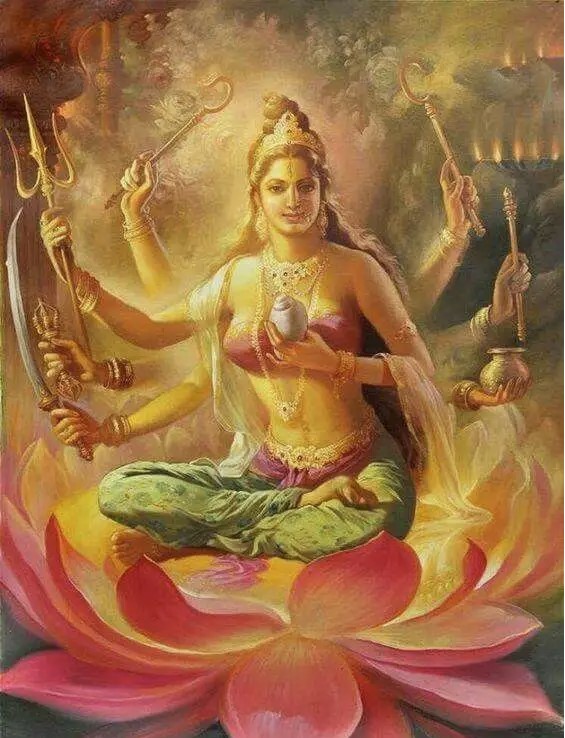
AA: That’s incredible. I thought so many times as I was reading it, what a different psyche I would’ve developed had I had those stories and those role models and like you’re describing, to have a temple with those images, it would’ve been so different to me. And I grew up Christian, and the Bible has many, many beautiful ideas that are still sacred and important to me, but it has, as you know, zero divine feminine, almost zero role models for girls and for women.
And I just thought about what it would be like to grow up with this. And that was really fascinating to hear. Earlier when you talked about your personal story and how you grew up in the family you did, with this empowering experience for women and then going out to the outside world and encountering what, I think you said the demons that were just on the loose in the culture. It seems like your religion, your Vedic tradition really is like a sanctuary and that those scriptures weren’t corrupted by patriarchy. Am I understanding that correctly?
AS: They were outside culture. Although there has been a lot of social layering and then corrupting, you couldn’t corrupt the religion itself because the scriptures are right there. But there are social norms that have come up, and so now the religion itself has become a bit more confusing for the average person. But there are large pockets of India and villages and deep tribal populations where women are living freely. Sexual freedom, financial freedom, intellectual freedom, because it comes from their roots. But wherever history and politics and social agendas played a role, their women have become conditioned, and dogma is ruling and women are dealing with very serious, stinky patriarchy, the worst kind possible.
And I dealt with some of it, and I thought that when I came to America I’d be done with it. But then I faced another cleaner, subtler, but equally dangerous version of it.
AA: Interesting.
AS: So the pain was universal. And maybe I’m resurrecting some sentimental ideals from the Hindu tradition, and I hope that Hindu women read my book as much as any woman of any other tradition. Because every woman on earth needs this empowerment. None have been left untouched by those demons.
AA: Yes. Okay well I want to get to these goddesses and have you highlight several of these goddesses that you talk about in the book. But I do have one more question that just came to my mind as you said that. I’ll just speak for myself, but I know that a lot of listeners may have the same question.
So for me, for whom it’s been a struggle in my personal life to again – love so much about the religious tradition that I came from – but to go to my sacred text that I come from, it feels like betrayal. And it’s deeply, deeply painful to go to my sacred text and find such misogyny in my sacred text and so much codified patriarchy in the Bible. So, I think sometimes what happens with white women especially, is that sometimes they can tend to seek comfort and seek wisdom and inspiration in other religious traditions or in other cultural traditions. And so the image that comes to my mind is like all these Americans who can appropriate, you know, women going to yoga classes and saying like, “oh, I’m so into yoga.” Or, you know, The Beatles going to India, it just becomes fashionable to kind of take on other people’s cultures and religions. And sometimes that can happen in a way that is disrespectful, and again, it’s cultural appropriation.
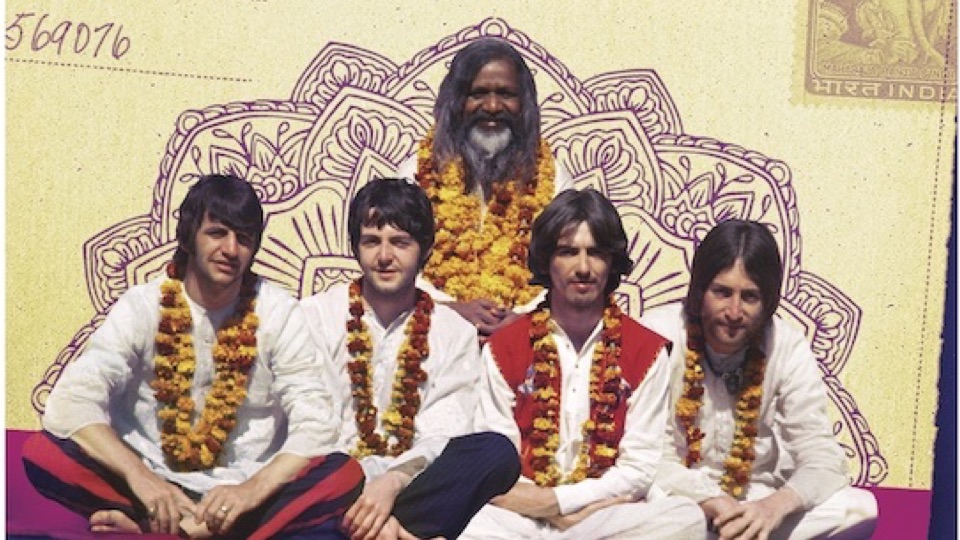
Do you have any advice or counsel for white readers of your book or white listeners in terms of how we should approach someone else’s sacred text, someone else’s culture, so that we are not guilty of cultural appropriation as we’re seeking wisdom from other people?
AS: Okay. So first I wanna clarify something: that Indians are also appropriating. The internet culture, the blue jeans, the Italian pizza. And you’ll meet average urban Indians talking with an American accent. And so what I want to say is that there is a universal culture being born, and the earth is now moving towards a universal sharing of ideas, concepts, and now perhaps gods and goddesses. This is a beyond specific culturalized religion to a world religion concept.
I have looked to Jesus Christ as an ideal in my life, especially when I see him being stoned and he says, “forgive them for they know not what they are doing.” And there are so many other episodes in his story that are inspiring to me, and I’m not going to think I’m appropriating. But I want to say this, I wanna say to listeners of this conversation, if they are tuning into you regularly, then they are already more sensitive. Bringing in the word appropriation is necessary, but not just for the white people or white women, but for brown women too, and Black women too. I think we all need to be respectful of the roots so that we can enjoy the fruits.
And I want to say this as a universal statement. Because I consider myself a world citizen, despite being a practicing Hindu. Or being born as a Hindu at least. But my tradition itself, Hinduism or true Sanātana Dharma tells me that I don’t belong to any one people, one land, one culture, that I’m an all-pervading consciousness, and that I’m simultaneously existing in all hearts. This is what I’m told. This is the truth of my tradition. And if I want to be a true Hindu, I want to be inclusive. But if I’m going to go to Sicily or I’m going to go to Ghana, and I want to borrow some elements from there, I want to acknowledge where it’s coming from. I want to be reading some of the books or authors or documentaries of native people. So if people want to know the goddesses more, if they read my book, that’s a step in that direction. Along with reading books by other authors, because they may be brilliant and they may say something I may have missed.
But doing our due diligence would be enough, but I think unapologetically we should now move our consciousness towards a shared world family culture. Appropriation is never okay. Whether we are children or adults, and appropriation in a cultural setting requires sensitivity, but it can easily be overcome through respectful homage to those first hearts that may have gleaned that knowledge or that cultural contribution to our world family. I hope that helps. These are my thoughts.
AA: That was wonderful. Thank you so much. Well, with that introduction, let’s talk about some of the goddesses. I would love to highlight some of these amazing deities in the book, and I know you talked a bit about Shakti already, but I wanted to start with her.
You say that the word Shakti is derived from the Sanskrit word, “shakt” which means capable of, to be able, to be able to perform. And you touched on this a little bit earlier, that power itself is conceived of as feminine. And so that’s the generative power behind the whole universe, which is such a different way of seeing it than I had ever really thought of.
AS: You know, I see form as masculine because it has structure, strength, stability, density, but I see the movement and the energy and the energetics of that as Shakti. And so Shiva, the masculine, is steadfast and still. And it is Shakti who allows for Shiva to dance, and so we have this dancing Shiva because of Shakti interfacing. And Shakti being feminine also then reminds us that whenever we really want to be capable. Whenever a leader of any gender wants to truly win and make a difference, we have to go into the feminine version of power, which is collaborative. Which is flexible, not rigid. Which is kind and compassionate, and fears at other times.
whenever a leader of any gender wants to truly win and make a difference, we have to go into the feminine version of power
So the feminine is changeable, and it morphs and adapts to the need rather than it being the one way. For so long, we’ve seen the masculine versions of power, and that is why our world is not happier. It may have changed and transformed, but we are not happier, we’re not healthier, we’re definitely not sleeping better as a result of it in this century. But the more we bring the goddess and her conception of power into our being and into our own lives, the more successful we become. So I always see these goddesses as archetypes, as symbolic of some teaching. So I want to work with Shakti, with feminine power, and I’m teaching my son the same, who’s an entrepreneur with a startup, that you have testicles and you have male hormones, but your power should be Shakti, should be feminine. And it’s helping him, you know, become more successful because power must be feminine in that sense.
Shakti is that ultimate goddess. She’s the non-dual one goddess. All beings, all animals, all creatures, all butterflies, all caterpillars, all little ants, we will all dissolve back into Shakti and we take form and emerge from her. And for a long time, one may think that this is all only mythology, these are only stories. But there is a Sanskrit saying in the Vedas which goes like this: Yad bhavam tad bhavati. “As you believe, so it becomes.” We are all living in a story, we are all thinking stories, and these stories have been told and retold for thousands of years.
And the more you see yourself as a participant in that kind of a goddess story, the more your life changes miraculously. And that is why Durga, who is the goddess of power and courage and forbearance and being authentic and being bold… you need that! Just to even survive, forget thriving, just so that others don’t abuse you and hurt you and break you and take the power out of you. You need Durga. And her name itself, Durga, is a mantra. It’s a magical transmission. And when you say “Durga, Durga, Durga” with intention, it opens secret doors in your own heart, and courage and authenticity and steadfastness emerge from you. Her story, which is alive, and only your karma allows you to listen to it or read it. It then enters your body and it becomes your memory, your DNA, your capacity, and starts enabling those words that were not coming out of your mouth earlier. Or enabling that courage which was hiding somewhere in your cells.
So, there is a cautionary side effect to reading my book or listening to it, which is: it’s now entered you. And now that the story is inside you, it’s going to change you. And then it’s going to force you to impart that story or that book to someone else. It’s like there is an awakening happening through the sharing of these stories. So Durga is that goddess and her mere memory makes us bold. For example, even till today, if I have to have a difficult conversation, I’m a human being, I might have a moment of, should I, should I not? And then I see Durga in my mind’s eye and I say, I might blunder at it, my heart might be terrified, but I’m going to open my mouth and I’m going to speak my truth. I’m going to say it softly, but uncompromisingly. And that’s that. That’s the modern-day goddess in me speaking up and saying, I’d like to have a conversation with you and that’s it.
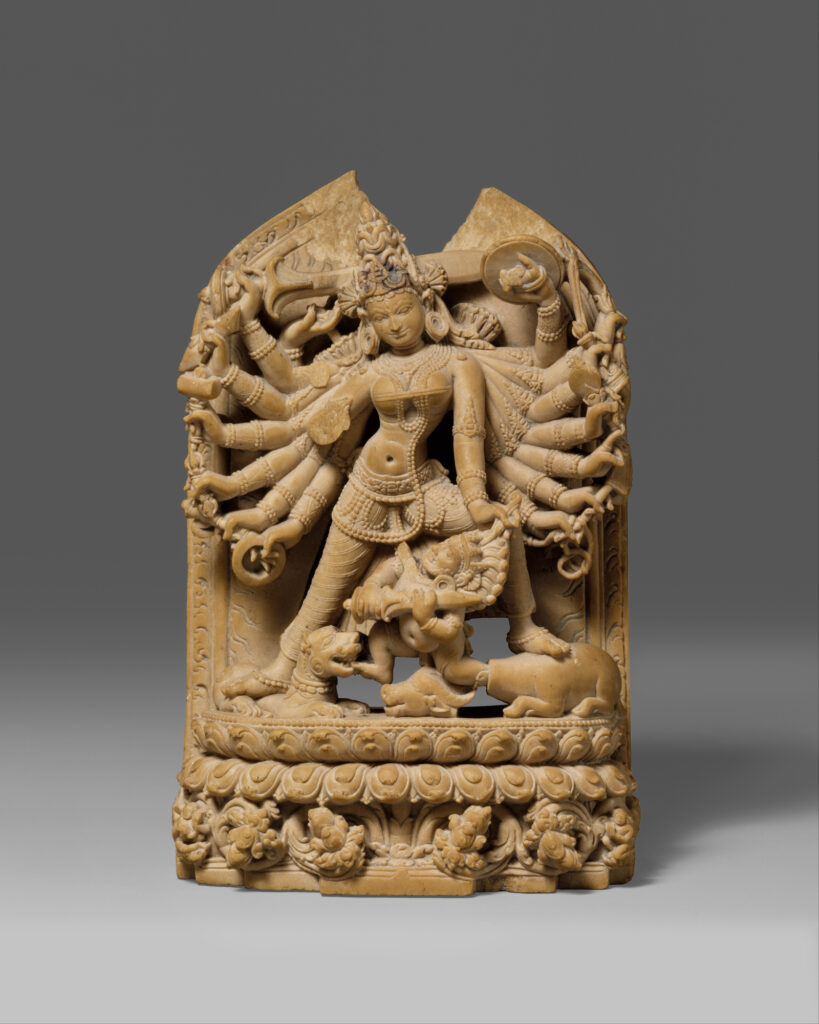
AA: I wondered if you could briefly tell us the story of Durga when she was incarnated as a woman and was sexually accosted. Would you be able to tell us that story?
AS: Yeah, in brief, but I have a whole chapter dedicated to it. And what she did was that she didn’t stay silent and she didn’t ask women across the world to stay silent for decades until it took a #MeToo movement to say “I was silenced”. She roared. She roared a “No”.
And there are two kinds of characters in Hindu mythology, Amy, the characters that represent light and the characters that represent darkness. The malevolent darkness, not the good darkness. And once the dark characters took over everything, earth, heaven, light was obstructed, and the characters that represent light were driven away from their land. They went to the male god, Shiva, Brahma, and Vishnu, and they said, this is beyond us, and if you want us to help you remember, power is feminine. They wanted to address the situation with power. So through their anger and through their righteous rage which they experienced, emerged a great light. And that light coalesced into the great goddess, a beautiful goddess Durga. But Durga was in a female, womanly, earthly avatar, a manifestation, and her name was Ambika at that time. She was so beautiful that it was hard to look at her. And her complexion was that of a thousand full moons. Her hair was as dark as the dark night where there is no moon. Her eyes were as large as a hundred lotuses swimming together. So she was just beautiful, beautiful.
And what Ambika/Durga did was she went to the area where these dark forces were, and she just hung out there on purpose. Until some of those dark characters saw her and they thought that she would make a great wife or a mistress for their leaders. Then situations connived and she was offered the hand in marriage like,” why don’t you become the wife of our leaders and they will treat you so well?” And she said no. So initially what started out as a proposal for marriage started turning into subtle threats like, “what’s a girl like you doing alone?” Like, “how come you’re not married and respectable? Do you need a man to make you respectable?” And after a while, it turned into clear threats, like “you better say yes or we’ll drag you by your hair.” So this is what a typical woman faces. This is what Ambika faced. Initial romance to lust, to then dangerous threats and even potential molestation.
But Durga kept saying no. And she said very strategically that if you want me, you have to win me in war. And she invited the dark forces to win her in war. Of course, she was invincible. She brought in through her rage through her third eye, Kali, who is a naked goddess, dark as the dark space out there, wearing a mala of skulls. Her nakedness represents her barebone truth. The skulls represent the death of egos and delusions and illusions. And she both had many aspects of herself through her being, and she was invincible in every way. And she killed even the last of those dark demonic beings who really represent arrogance, who represent entitlement, who represent sexual privileges, who represent what a female oftentimes has to bear on earth today, which is the out of control lust of the male species.
But Ambika not only said no, but we saw her relax during this war. We saw her roaring, and cheerful, and even drinking wine during her battle which I really interpret as taking care of herself during this process. She birthed more versions of herself, which represents that she was multifaceted, but I’m now thinking it also represents that she had support for herself and ultimately it was a feminine victory. And when Ambika stood victorious alone, all the male gods collected in the heavens and poured flowers over her, and they started singing mantras and chants to the glory of the goddess Durga. Because then everybody on earth recognized this is not just a woman called Ambika, every woman has Durga inside her really.
So this is the story of a goddess, too, being sexually accosted and how she dealt with it in once-upon-a-time land.
AA: I thought that it was so powerful to read about the practical application of this goddess, and like you said, that you can invoke her even by saying her name. And you talk about a time when you were bullied in elementary school and that it was Durga who gave you strength. And one section of the book that I again thought was so powerful, was when you wrote about the Gulabi Gang and that it was like an embodiment of Durga. Could you talk about that briefly before we move on to the next goddess?
AS: Gulabi means pink, and interestingly there’s a pink gang in America and there’s a Gulabi gang in India. And these women wield sticks. And these are largely uneducated women of different religious groups, maybe Hindu, Muslim, Christians, but they live in the villages.
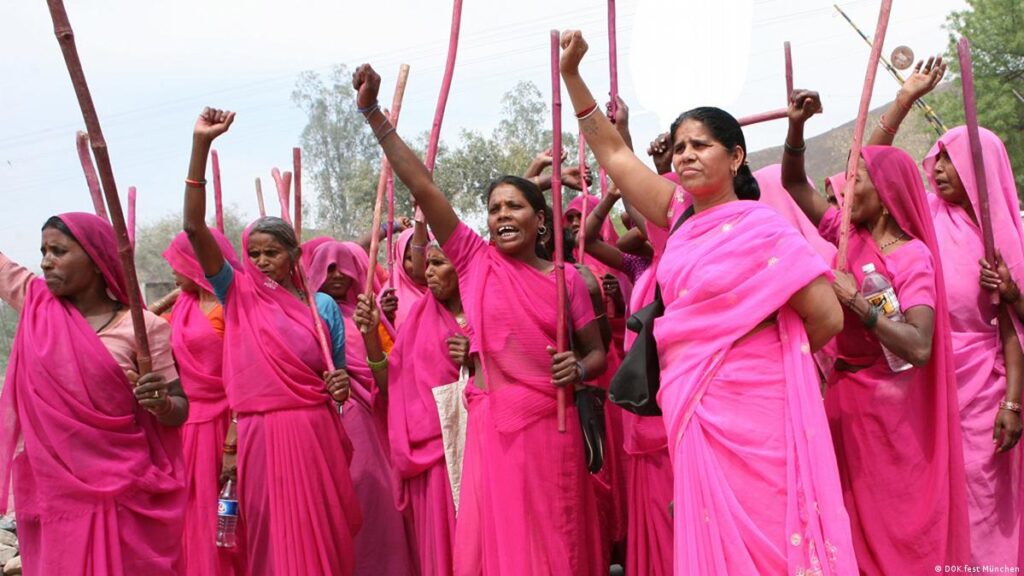
And there is one thing common that they have: they’re dealing with domestic abuse or other abuse related to their gender. So these women have come together. They wield sticks. Initially, they used the power of persuasion to say to someone, stop abusing your wife or your daughter, or your sister, or your daughter in-law. But when the offending person does not listen or does not cease, does not understand that he’s not dealing with just weak, vulnerable, uneducated women, but he’s really dealing with goddesses here, then they don’t hesitate in using their sticks to to beat that person black and blue, to send a message across. And this group has gained so much strength in numbers across India and neighboring countries. Now I hear that, I’m happy to say that a woman wearing pink strikes terror in the hearts of many a village thug or someone like that. And they are Durga worshippers, by the way, openly. And no matter what their religion, they will say “Jai Durga, Jai Durga.” Jai means “Hail Durga.”
AA: Wow. That is so powerful, and I so appreciated that chapter in that section of the book. We’ve talked a lot before on the podcast, on other episodes about how women are socialized to not express anger and to be meek and submissive and to go along with things. And so knowing how and when to embody that power to set boundaries, sometimes even like you said, sometimes violently in self-defense, is really something that’s important for women, I think, around the world. So I really appreciated that.
If it’s okay, I’d love to move on to Lakshmi. This was another really wonderfully interesting chapter to me, and I had a lot of my own personal reckoning with some complexity in this one, but can you tell us about Lakshmi?
AS: The whole world is in love with Lakshmi. Anybody who’s aware of the Hindu goddesses, she’s one of the very favorite ones because she promises wealth, beauty, fertility, sexuality, and everything that’s nice and comforting because she is a goddess who grants us that kind. Abundance, not just money, but abundance in relationships and in everything. So say I wanna have a better relationship with my son, then she’s the goddess. I’m gonna say, “hey, can you make it more juicy between me and my son?” Or say, I want more flowers in my garden, then I’m gonna say, “Lakshmi, come visit me in my garden so I can have an explosion of flowers.” And it’s true because Lakshmi, literally, her name too, is a mantra. And Lakshmi is connected with the word lakshy. And lakshy means goal. And this is related with our small goals of like, I don’t want to go hungry. I want to earn enough to make a living, to our big goals of self-realization and self-actualization.
So she’s the goddess for every human to make our life comfortable on earth. And she’s overflowing with every abundance to give us that. So I grew up praying to her and remembering her a lot on many occasions in my life. But then when I went into her mythology deeply, I realized that there was a time when she too had been taken for granted. And I talk about this, and instead of staying in those relationships where she was being taken for granted, she shows us how to be a goddess by showing us how she detached from those relationships. She left, and then she returned back to those relationships but she was a different person. And she chose a different partner for herself. She was not bitter, she was not angry. She had just reprioritized herself. She had gone inside to come back out again with greater self value intact. And because she’s whole, and because she ensures she remains whole, is how she can give us gifts.
And so when I was broken, when I was stuck in a marriage, Amy, that was not serving me or respectful of me, that was frankly abusive. I remember that I had no Lakshmi essence within me whatsoever. I was unhappy, I was depressed, I was unhealthy. I had no glow, no joy, I was very un-Lakshmi-like. But I remembered her story. And I decided that I’m going to revalue myself, reprioritize myself, re-love myself, and now I’m a giver of gifts. A Lakshmi-like guru, a teacher to so many worldwide.
I resent Lakshmi’s one story being told of her being happily the partner of Vishnu and being a giver of gifts. And people don’t talk about the story of when she was not his partner, when she was partnering up with those other characters, maybe worthy characters, but not good enough for her, who didn’t show her the respect she deserved. And that’s a story in the book that they can read, the listeners. And how she disappeared in the ocean of consciousness, that means she went inside herself. And so I feel like I wanted to bring this story out, this was one of the important stories for me to tell in this book. Also in modern India, where patriarchy is much more dominant than when these stories took place. You know, a modern daughter-in-law is told “Be a Lakshmi,” give us gifts. Give your husband sex whenever he asks. Give the in-laws a male child when they demand. On demand, give birth. Go to work, give us a pay package. And when you come home, clean up the house, wash the utensils, cook food, and keep smiling and look beautiful while you’re at it. And show us some belly button there, baby. Because you’re Lakshmi, aren’t you? Well forget it. Today’s Lakshmi will say no, and she might say no to all these false expectations, is my hope.
Today’s Lakshmi will say no, and she might say no to all these false expectations, is my hope.
AA: Again, I just so appreciate the role models that these goddesses provide. They’re really complex and really nuanced and interesting stories. Like you said, just even an evolution of this one character and all of the things that we can learn from those narratives are really amazing. Alright, the last one that I wanted to ask about today is Saraswati. Can you tell us about her?
AS: Saraswati comes from the root towards “saras” which means to flow. So she’s the goddess that awakens within us when we connect with our soul flow. When we get obstructed by pleasing people, or meeting false ideals and expectations, even religious dogma, institutional requirements. When we regain our flow, we are in connection with Saraswati. And Saraswati’s old stories show how others tried to obstruct her, and I share that mythology, but she kept flowing. She used her greater discernment to know whether this stuff is important enough to have an emotional breakdown or keep moving, and she decided to keep moving. She remained awake when everybody else around her fell asleep, metaphorically speaking.

So her flow is important. She’s also compared to a river. The Vedas talk about the River Saraswati. In fact, this river is so important that the Indian civilization is known as the River Saraswati civilization. And this river keeps flowing, and in the same way we should keep flowing. When we flow, we must remember the direction of the flow. A river doesn’t flow upwards, right or left because then it becomes a flood, and a cause of ruin for so many lives and for nature. But when the river moves in her own channel towards the great ocean, to be assimilated in it, that is when it is in greatest alignment with the allness.
In the same way, we should flow in alignment with our intuition, with our dharma, with our conscience, and with our greater life purpose. And then in the book, I go on and talk about the stages of life, which can define what kind of flow we should have. For example, we may have the flow towards relationships. We have a flow towards being more inward and introverted, or we may have a flow towards our spiritual journey. We should stay loyal to our path, and we should cultivate that flow. For example, I’m a married woman. I’m married again. Been married now for 22 years with my second husband, current husband. I’m a mother, I’m a teacher, I’m a speaker. But beyond all this, the Saraswati part of me is a quiet monk. I’m a mystic, I’m a silent person. So while I do everything, I spend a lot of time doing nothing. And being deeply restful and contemplative. So Saraswati’s mythology and her teachings towards the last part of the book are not asking us as much as soothing us. To be who we are is my hope.
And Saraswati is shown in our iconography as playing music, an instrument called the veena. And I compare that to listening to your own music when all the other sounds and noises of the world no longer have such a control over you. And for a long time, Amy, despite being born in a spiritual family, having spiritual knowledge, the world was so important to me that I could hear me. And though I had all the knowledge, it was not magical. But now there is me and the knowledge alone. And as a teacher, I’m the best version of me. As a speaker, as a writer. I feel so graced, so blessed and graced by the presence of Saraswati within.
So she awakens within us, our final intuition, our fertile silence that births music, art, creativity, and she awakens within us this flame of recognition. Are we on the right path or should we massage our way out of this path into a new path? She kind of wakes up that wisdom for which we outsource it to therapists and gurus and teachers and books. And now it’s like, she’ll guide us. And so she’s the great goddess who I say is like the final goddess who one day in meditation makes us recognize our own goddess essence. And at that time, the outer worship and the outer quest ends and the inner meditative journey and the inner devotion begins.
AA: This is something that I know so many people struggle with, and especially in a Western context and even in some areas of the United States more than others. Having spent a long time in the Bay Area and the fast-paced hustle, to hear the concept of living a quiet contemplative life where you make space for that and get in tune with the self. And it does take time and space and quiet to really get in tune with the self, that’s something that is, I think, so needed. And so thank you for sharing that.
All of these archetypes I think are just so valuable, and I do want to recommend to listeners again, to read this book, not just because it’s so fascinating to learn about, but because it’s really deeply moving. And there’s so much richness in wisdom that can be applied to everyday situations that we’re in. So again, I want to thank you, Acharya Shunya, for this book, Roar Like a Goddess: Every Woman’s Guide to Becoming Unapologetically Powerful, Prosperous & Peaceful. And thank you so much for this conversation today.
AS: Thank you.
As you believe,
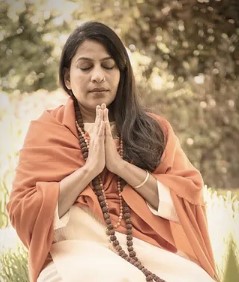
so it becomes.
Listen to the Episode
&
Share your Comments with us below!

